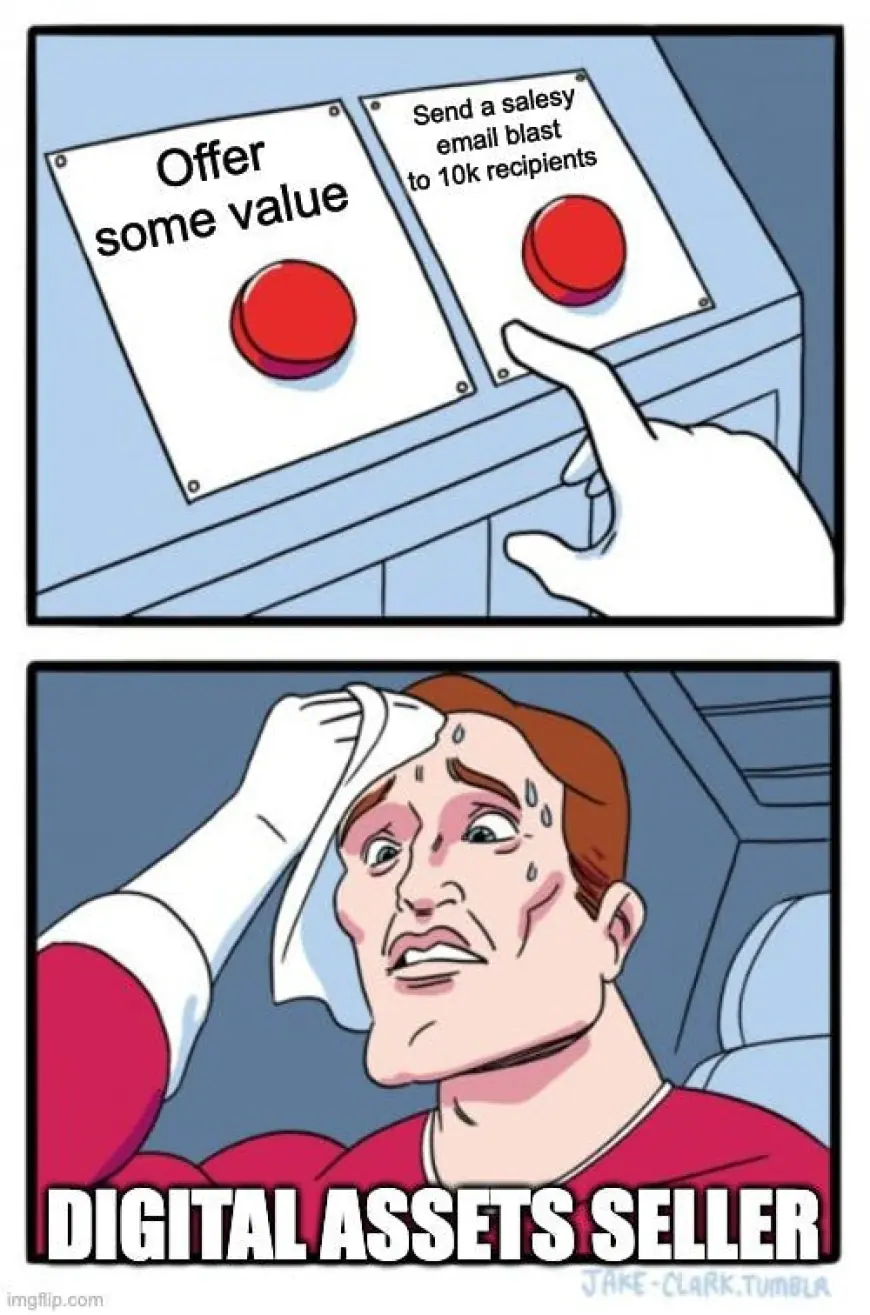Dos and Don'ts of Cold Outreach for Digital Product Proposals
Promoting digital products effectively requires understanding your audience, personalizing outreach, and keeping messages short and engaging. Don’t rely on generic mass messages or overly aggressive sales tactics, as they often push people away. Instead, share social proof by highlighting what others think, and use gentle follow-ups to maintain interest without being pushy. With a friendly, value-driven approach, you can turn casual interest into loyal customers.

\ As the founder of a digital commerce tool, I get a lot of questions like, “I set up my store, uploaded my products - now how do I get customers?”
\ Some people jump right into social media with posts like, “Hey everyone, I’ve just created a great eBook about applying for an O-1 American visa. Come check it out!” But let’s be honest, that kind of message barely grabs attention—most people just tune out that type of pitch.
\ So, I’ve pulled together a few tips for freshly minted online entrepreneurs to help you get started.
Identify Your Audience
You might think that your products are interesting to anyone. Hmmmm, maybe, but it can also show that you just don’t really know your audience. What do they like, what do they watch, what do they do in their free time, and where do they hang out? There are hundreds of other questions that could be asked, but let’s not overcomplicate things and start small.
\ The main goal here is to narrow down your focus to find an audience more likely to buy your product. Here’s what that looks like: let’s say you’ve just launched a Turkish pastry cookbook. If you promote it randomly on any channel with a big but completely random audience, the process starts to feel like gambling. Sure, you might attract a few people and even make some sales, but trying to turn that approach into a stable sales channel won’t work—it’s random, and you can’t build a reliable system on random.
\
\

\ On the other hand, you can make an educated guess about the kinds of people who’d be interested in baking Turkish pastries. Think home bakers, foodies, or people who love international cuisine. Look for people hanging out on cooking forums, following cooking content on social media, or reading food blogs. Reaching out to these people multiplies your chances of being recognized, and, even better, appreciated.
\ ✅ So identifying your audience? Definitely a DO
Send a Standard Message to All
Now, you compile the best message about your book, explain why it’s great, highlight all the benefits for customers, and… send it to every single person you can reach. You might think, “Hey, more eyes on my book, right?” But here’s the catch: when you blast the same message to everyone, it comes off as, well… cookie-cutter. People can sense when something’s mass-sent, and it feels like spam.
\

\ Imagine a Turkish pastry cookbook landing in the inbox of someone who’s never baked a day in their life. Or someone who’s just there for the quick dinner recipes and isn’t interested in mastering baklava. They’re probably not going to care. Worse, they’ll just ignore it altogether.
\ Instead, imagine taking a few extra seconds to make it feel a bit more personal. Spot someone who’s posted about their latest baking success? Drop in a line about how your cookbook might be the next thing they’d love to try. Or if someone’s always sharing recipes from different cultures, point out how your book dives into authentic Turkish flavors. That little extra effort? It’s what turns a message from “meh” to memorable.
\ ????♀️ So sending a standard, impersonalised message is a DON’T
Keep It Short and Simple
The attention span of a person today is about 8 seconds. That means you have only 8 seconds to grab their attention. Now imagine your long, detailed message, lovingly written to highlight every aspect of your cookbook, being shown to someone who quickly scans the text without really reading it. It just gets ignored.
\ They skim over it, maybe catch a word here or there, but that message you put so much thought into? It just blends into the noise. People today are bombarded with messages left and right—long-winded ones just don’t stand a chance. If your pitch takes too long to get to the point, they’ll move on before they even know why your cookbook’s worth their time. All that heart and detail you poured in? It’s lost in a quick scroll.
\ Instead, think bite-sized. Lead with a line that grabs them: “Master the secrets of Turkish pastries in your own kitchen.” Boom. In one line, they know what’s in it for them. After that, just a little teaser about what makes your cookbook special—maybe it’s a recipe for authentic baklava or a dive into regional favorites that are hard to find outside Turkey. Short, sharp, and inviting. Just enough for them to say, “Wait, tell me more.” That’s when you know you’ve hooked them.
\ ✅ Please, DO keep it simple
Focus on Making the Sale
You started all this to make sales—lots of them—and there’s nothing wrong with that. You’ve put in the work, gained experience, spent your time, and made a real effort to create something valuable. Naturally, you want to sell it as a polished product. After all, we live in a world of capitalism; selling is part of the game.
\

\ But here’s the big BUT: nobody likes feeling like they’re just a walking wallet. When people sense they’re being treated as nothing more than a sale, it’s a quick turn-off. Instead, start by sharing a little value upfront—something that shows them the benefit of what you offer without pushing for the sale. For our Turkish pastry cookbook, maybe it’s a quick tip on mastering flaky dough or a recipe for a popular pastry. Give them a taste of what they’d be getting, and let them see the value themselves.
\ This way, you’re building trust first, proving you’re here to offer something genuinely useful, not just to make a quick buck. People are far more likely to buy from someone who respects them enough to share value first. It’s a simple way to make them curious instead of feeling pressured.
\ ????♀️ Nobody likes to be a victim of unexpected aggressive sales. So DON’T
Share What Others Think
Would you buy a book because a salesperson persuaded you, or because ten other people said it’s great? Well, both methods can work, but let’s be real: we’re social animals, and we rely on the opinions of others. If at least a handful of people can share a few words about your product—how it helped them, how cool it is—that can make a huge difference in building credibility.
\ You might be struggling to get your first feedback, but don’t overlook your closer circle. Your family, friends, and their friends can be fantastic first reviewers. Reach out to them and ask for honest opinions. Encourage them to share their thoughts publicly, whether it’s a quick post on social media or a review on a platform where potential buyers might see it. Their endorsements can provide that social proof that makes others feel confident about giving your product a shot.
\ After all, people trust recommendations from real users way more than a slick sales pitch. It’s all about showing that others have found value in what you offer.
\ ✅ So go ahead and share what others think—because it’s a solid DO!
Neglect Follow-Ups
Do you reply to all the emails and messages you receive? I used to do so, and I was actually surprised when I found out that not everyone does. Actually, I started to ignore them recently when I started to receive more of them, and a lot of them are far from relevant for me.
\ People ignore messages not because they are rude. It’s just their right what to do with the received message. And pretty often they just miss some of them or decide to reply later and forget. Life happens, and this is a usual situation. So don’t hesitate to send a kind reminder after some time. A gentle nudge can be the perfect way to reignite interest without being pushy.
\ ????♀️ So don’t just sit back and hope for the best—neglecting follow-ups is a definite DON’T if you want to keep the conversation going!
The Final
Even great products need to be marketed properly. Success isn’t about throwing everything out there and hoping it sticks - it’s about building relationships, being genuine, and giving people a reason to care about what you’re offering.
\ Follow my digital product commerce saga on ???? ???? https://x.com/alexhustles
\
What's Your Reaction?









































































































